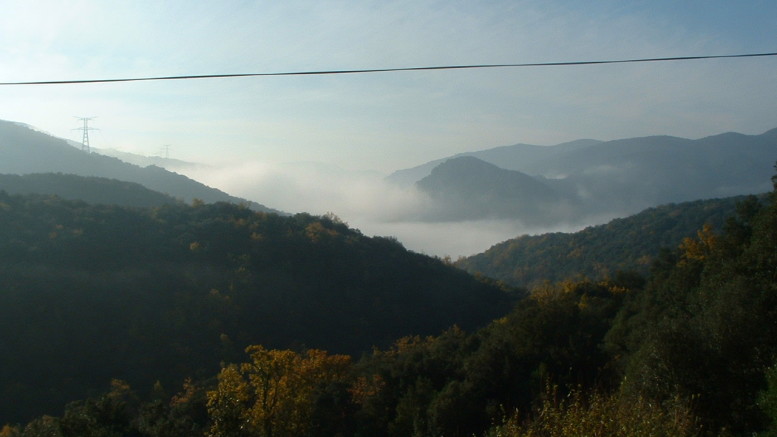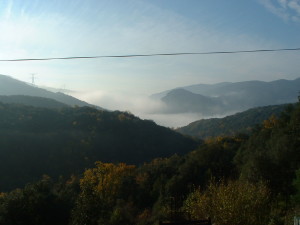The French Government is in the process of re organising the management of national forests, they are running down the state management by the l’Office national des forêts, and increasing looking to privatization as the solution for future forest management. Not only is this a short term fix to a long term issue, it runs counter to a rationale solution to counter climate change, promote biodiversity, promote sustainable rural communities and build robust rural economic development.
As reported by Reporterre.net Forêts publiques : l’État réfléchit au démantèlement de l’ONF the French state has been running down the l’Office national des forêts (ONF). In 1985 the ONF employed 15,000 people, by 2018 this has dropped to 9,000. Last year, the then director of the ONF, Christian Dubreuil, announced 1,500 more redundancies, or non replacements, in the next five years, this year alone the ONF have announced 460 redundancies.
The causes of this massive reduction in personnel are not difficult to find, the ONF has a on going debt of 360 million euros. In the least five years tree felling in state forests has gone up 35% but the revenues from sales have dropped 30%, added to this the government subsidies for the work of the ONF in communal forests has been radically reduced. With it’s two main revenue streams dropping the ONF has only one solutions, reduce overheads, which in this case means reducing staff numbers. Even with these radical cuts the ONF is still running a deficit of 40 million euros per year.
The reduced revenues from wood sales is a little difficult to understand, according to the AgriFrance Report 2019:Forest in France says “The autumn 2018 sales confirmed another very strong trend in demand for oak that has lasted for more than five years. The increase was much less apparent in other hardwood species. The softwood market improved and prices were firmer, despite large volumes coming to the market.” So either the ONF have been felling varieties of wood in the wrong category, or private contractor costs, the majority of the actual work in the forests is done by private firms not by ONF personnel themselves, have risen.
The French Government has for a number of years been studying the future of public forest management. They have already published a consultation proposal to simplify forest management administrative procedures which seeks to exclude the ONF from decisions on land clearing of national forests. «Cette mesure de simplification administrative pourrait favoriser la déforestation en France» (Trans) “This measure to simplify the admnistraion will favour the deforestation of France” says Snupfen (Syndicat national unifié des personnels des forêts et de l’espace naturel).
On 7th June 2019 the Ministry of Agriculture announced at the Congrès national des communes forestières at Épinal that communes would have the right to manage their forests themselves, or use another organisation, read a use a private company. This new approach dovetails with an ongoing campaign from the Tresor directorate of the Ministry of the Economy which in 2010 noted « À moyen terme, il pourrait être utile d’étudier la proposition de déléguer la gestion des forêts communales sous forme de concessions à des prestataires privés », (Trans) “In the medium term it would be useful to study the proposal to delegate forest management under the form of concessions to the private sector”.
This approach of seeing forestry management simply as a business has already had a serious impact on the orientation of the ONF which has been under strong governmental pressure to reduce it’s losses. For Michel Benard,, trade unionist in the CGT Forêt «l’Office national des forêts cherche à maximiser les profits…Il se comporte comme une entreprise privée qui doit dégager des bénéfices» (trans) “The ONF is looking at ways to maximise it’s profits, it behaves like a private company dedicated to profit” « Il ne s’agit pas de défendre en soi l’ONF mais un véritable service public qui réponde aux attentes de la société ».(trans) “It is not a matter of defending the ONF in itself, but a real public service that meets the expectations of society.”
Is looking at the books and proclaiming that radical change has to happen to make the forest profitable to right way to look at the picture? Should France’s forests be run solely on the basis of profitability?
«La France est un grand pays forestier» Emmanuel Macron
Of France’s 55010,000 hectares of land, 15954,000 hectares are forest, that is 29% of the entire country. Just over a quarter of that is state owned, 26% in 2005. Of that 26% 38% is owned by the national state, and the other 62%by communes.
In terms of carbon stockage in biomass Frances forest represent a huge carbon sink. These are the latest figures I could find.
| CARBON STOCK IN LIVING FOREST BIOMASS (million metric tons) |
|||
| 1990 | 2000 | 2005 | 2010 |
| 965 | 1049 | 1165 | 1208 |
| CARBON STOCK IN LIVING FOREST BIOMASS (per hectare in tons) |
|||
| 2000 | |||
| 76 | |||
Source https://rainforests.mongabay.com/deforestation/2000/France.htm
As well as carbon sinks effective forest management is vital to limiting soil loss from floods and erosion, indeed a key role of the ONF is coastal preservation and preserving forests in mountainous areas. building the quality of soil requires sustainable forestry management. No where is that more apparent than here in the Hautes Corbiers, see Revolution and Environment in Southern France.
Instead of looking at the forests of France as simply a source of revenue, an approach which valued their role as carbon sequestraters, and if in a capitalist society that involves putting a price on carbon sinks per ton of carbon stored than so be it, would re value the work of the ONF. In oethr words pay the ONF for trees it does not chop down as well as those it does. Such an approach would actively encourage both the public sector to re plant trees, and it is worth noting that over 70% of France’s forests are actually in private hands. While in ideal world I would like to see these returned to public management in the short term encouraging private owners to effectively and sustainable manage their woodland, through training and by paying them for their carbon stockage would vastly improve the levels of carbon sequestration.
What is needed is to shift the focus away from profit, and conservation ecology towards a pro active reforestation. Departmental, regional and national plans need to drawn that combine agro forestry, re wilding, building up local, native tree stocks, soil management, water management, protecting biodiversity and providing sustainable economic development around forestry in rural areas. An expanded ONF needs to works with scientists on the most appropriate plan for each region. Local, departmental and regional governments need to be trained on sustainable forestry management so they have the skills necessary to work effectively with the ONF. Government grants based not on profit but carbon capture need to be made available to large and small communes to encourage re forestry with the regional plan
Take my own Hautes Corbieres for example, less than 5% of the land is now farmed. The rest is a mess of communal forests, some oak, some pines, deserted garrigue, and low level young un-managed oak forest. The terrain is mountainous, dry with poor soil. It is highly unlikely that the vast majority could ever return to arable land. However re foresting of appropriate varieties of trees, with grassed fore breaks along water courses kept low by the farming of sheep and cattle, ad if enclosed goats would have the advantage of minimizing the risk of wild fires, provide hunting land for our raptors, and improved access to the forest for forestry workers. It would over time improve the quality of our soil. Here at Montrouch we have 21 hectares of unmanaged young oak forest. This side of Mont Tauch is dominated by similar forest and garrigue. I would love to work with professionals to improve the quality of our forest, and expand the range of varieties of the trees beyond just green oaks and improve the biodovesity of our land. Mont Tauch after all means the Yew Tree mountain, it is now a mountain with no yews growing on it. But the simple and painful fact is that there is no value in doing so, so beyond felling the smaller trees for fire wood and leaving the larger trees alone to grow I cannot afford to do anything to our forest.
By giving value to carbon stockage small, lightly populated communities could at last realise the value of their land, and have the access to funds to effectively manage it for the benefit of society in general.
Funding wind farms managed by large multinationals to reduce carbon emissions from the energy sector is one solution, building up sustainable rural economies based on sequestrating carbon however seems to be to a much more appropriate and ecologically sound approach.
So instead of cutting the ONF and farming out their work to private companies we should be expanding the ONF, building up the experience and scientific knowledge to develop a sustainable rural France.



The Best Technology for Fighting Climate Change Isn’t a Technology: It’s Forests
https://www.commondreams.org/views/2019/03/27/best-technology-fighting-climate-change-isnt-technology-its-forests?utm_campaign=shareaholic&utm_medium=facebook&utm_source=socialnetwork&fbclid=IwAR2EOVXI4Toc2SwZUrq22toC9W1Ybd6EndGQAR0CyiF7Ju96XbDoJYlnw1U
“Yet the international focus on fossil fuels has overshadowed the most powerful and cost-efficient carbon-capture technology the world has yet seen: forests. Recent scientific research confirms that forests and other “natural climate solutions” are absolutely essential in mitigating climate change, thanks to their carbon sequestering and storage capabilities. In fact, natural climate solutions can help us achieve 37 percent of our climate target, even though they currently receive only 2.5 percent of public climate financing.”